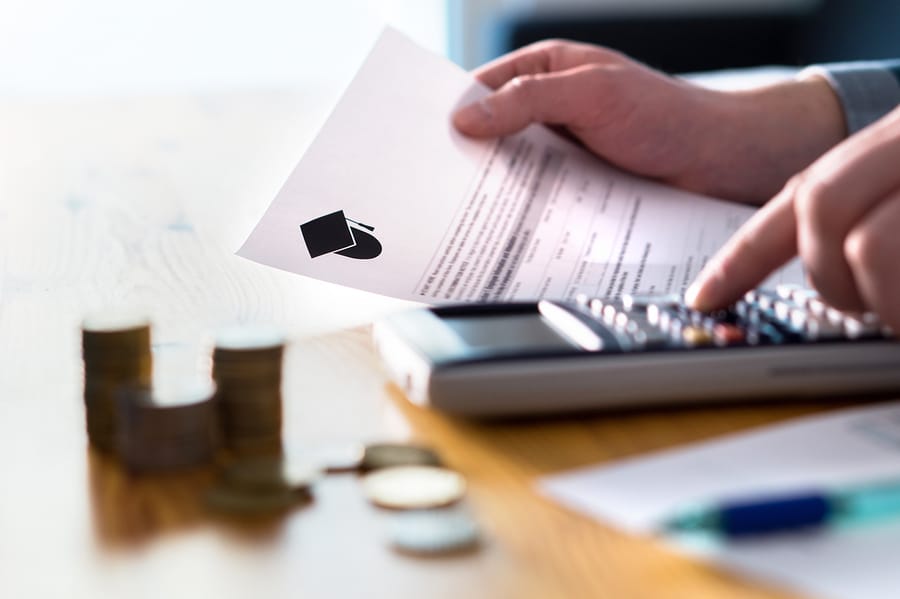
Many federal student loan borrowers can take advantage of Department of Education programs that limit monthly payments. In fact, there are four repayment programs that limit monthly payments based on discretionary income.
These options also allow borrowers to receive loan forgiveness after completing the specified number of timely payments required by their chosen Repayment Plan. For instance, Income-Based Repayment (IBR) provides loan forgiveness after making 20 to 25 years of qualifying payments. However, many borrowers do not realize that at the conclusion of the Plan when the balance remaining is forgiven, as the law stands now you will receive a notice (or 1099 Statement) indicating you will have to claim the forgiven amount as income. You could find this to be a very unwelcome surprise after thinking you had made your final payment.
It is difficult to determine how much you would have to pay after completing your student loan payments through an income-driven program. You would need to know your income for the year the remaining debt is forgiven, your tax rate and other factors. This means it is probably not possible to plan ahead for this tax bill, which could be several thousand dollars depending on the balance of your loans. There are also different rules for insolvent borrowers.
Does a possible “tax bomb” mean you should not enroll in an income-driven repayment plan? Of course not. These options can help you avoid default if you are struggling with payments. You can enroll in an income-driven repayment plan if you do not have a job.
Federal lawmakers may even fix this tax dilemma at some point in the future. Some have already made attempts. States could also pass their own legislation to address this issue at the state level. California passed legislation to help ease the tax burden on student loan borrowers.
You also do not have to stay enrolled in an income-driven plan. If you determine it would be in your best interest to pay back your loans under a 10-year plan, then you can re-enroll in a 10-year plan.
Are There Other Student Loan Forgiveness Options?
There are other ways you can receive forgiveness on federal student loans without having to worry about a giant tax bill.
- PSLF: Your first option, at least if you are eligible, is to enroll in Public Service Loan Forgiveness (PSLF). With this program, you can receive loan forgiveness after making 120 qualifying payments. You would need to be working in a public sector or qualifying public service job to enroll. Although PSLF is confusing, you can receive tax-free loan forgiveness if you meet the program’s eligibility requirements. Our prior blogs go into detail on what these eligibility requirements are and what to look out for during enrollment.
- Teacher and Nurse Loan Forgiveness: You may also be able to receive tax-free loan forgiveness if you work as a public school teacher. These are other options in addition to PSLF that can provide loan forgiveness under the right circumstances. For instance, with the Teacher Loan Forgiveness Program, you could potentially receive up to $17,500 in loan forgiveness. If you have Perkins Loans, then your loans may be 100 percent forgiven. You would need to meet the program’s eligibility requirements.
- Student Loan Forgiveness for Nurses: There are also tax-free loan forgiveness options for nurses and other health care practitioners under the National Health Service Corps Loan Repayment Program. You would need to work in areas with critical health care shortages to qualify.
There are also situational loan forgiveness options. If your student loans are discharged in bankruptcy, which is possible despite popular opinion, then you will not need to pay taxes on the discharged amount. Additionally, you may be able to receive tax-free loan forgiveness if your school closed before you could finish a degree or if you are permanently disabled. You could talk with a student loan attorney to learn more about these options.
About Our Kansas City Student Loan Lawyers
The Sader Law Firm can help struggling student loan borrowers review debt relief options. If you have questions about filing for bankruptcy or debt relief for student loans, then we encourage you to contact us. You can reach our Kansas City student loan lawyers by dialing (816) 561 1818 or by using the contact form on our website.
 Book an
Book an Email
Email Directions
Directions







